The 9/11 Factor – When Do We Get Past “Too Soon”?
I stole this idea from a post I read on The Velvet Cafe earlier this year, written by Jess after she went to see The Avengers. In that post, she made a point of questioning whether or not the destruction of New York, as depicted in that film, was too close a reminder to the horrible events of September 11th, 2001; the destruction of New York City skyscrapers thanks to Loki’s invading alien armada caused a few critics a little more than a minor concern. Also within The Avengers was a small insert shot of people sticking “missing” notices up on public landmarks, much like the population of NYC did in the immediate aftermath of 9/11, when hundreds of people still remained unaccounted for. This, perhaps more than the building destruction depicted within the film elicited more than a minor reflex thought about 9/11, and the question was raised over on Jess’s post: at what point do we move on from a major tragedy such as that, and allow creative freedom to rein in our art?

Okay, this post involves a little plagiarism. I stole this idea from a post I read on The Velvet Cafe earlier this year, written by Jess after she went to see The Avengers. In that post, she made a point of questioning whether or not the destruction of New York, as depicted in that film, was too close a reminder to the horrible events of September 11th, 2001; the destruction of New York City skyscrapers thanks to Loki’s invading alien armada caused a few critics a little more than a minor concern. Also within The Avengers was a small insert shot of people sticking “missing” notices up on public landmarks, much like the population of NYC did in the immediate aftermath of 9/11, when hundreds of people still remained unaccounted for. This, perhaps more than the building destruction depicted within the film elicited more than a minor reflex thought about 9/11, and the question was raised over on Jess’s post: at what point do we move on from a major tragedy such as that, and allow creative freedom to rein in our art?
In the immediate months after 9/11, Steven Spielberg’s AI: Artificial Intelligence was released to critical acclaim (it didn’t do so well at the box office, if memory serves), and I remember at the time the massive consternation of the inclusion in the films’ final reel of images of the now-destroyed World Trade Center, in a post-human Earth landscape. Spielberg had the chance to “digitally alter” the film to remove the buildings in order to counter being accused of somehow “using the images of those buildings to evoke an emotion from a real-world event” to further the impact of the film. Just how that was ever going to be accepted as a valid argument is beyond my comprehension – the film was finished well before 9/11 and no doubt Spielberg had no reason to think that that particular scene might cause controversy at the time he completed the movie – but it did beg the question; how long after an event like 9/11 is long enough to use that imagery in a creative art-form such as film? Remember the original Spider-Man theatrical trailer, one which featured a bunch of criminals trying to escape a robbery by flying a helicopter over New York, only to be caught between the twin towers by Spidey’s web? It was pulled immediately after 9/11, and for good reason. The Arnold Schwarzenegger film Collateral Damage was held back from release due to it’s controversial narrative regarding terrorism, and the fact that the title of the film itself might cause distress to grieving Americans?
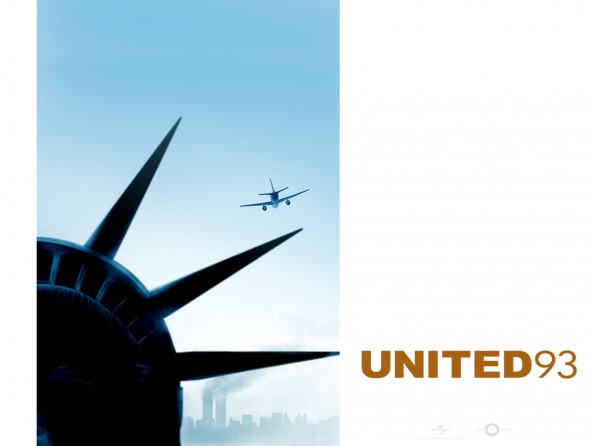
In the years since, the use of imagery from 9/11 has primarily been used in a contextual format. Two feature films about 9/11, the Oliver Stone flick World Trade Center, and the Paul Greengrass thriller United 93, used the imagery of the day as a legitimate backdrop for the true stories they were depicting. The JJ Abrams-produced sci-fi thriller Cloverfield not only had destruction being wreaked on NYC, but it outright stole collapsing twin towers iconography for the sole purpose of tapping into that awful fear and horror we all felt that day. The Robert DeNiro film Ronin, which depicted a long and involved car chase through the streets of Paris, was accused of stomping on the memory of the then-recently tragic death of Princess Diana in a car accident in a tunnel in that city. And what, I ask, does the Kennedy family think each time somebody uses the killing of JFK to sell a film: be it Oliver Stone’s damning JFK, or the countless other alternative theory concepts bandied about by films (remember Watchmen, for example, had The Comedian directly responsible for JFK’s death?)… what would you say if people continued to use the death of your loved one for entertainment purposes?
Where I think the line is drawn is intent. Often, a filmmaker will use some sort of iconic image to elicit an emotion they may or may not be capable of creating on their own. A cinematic shorthand, if you will. Many mentioned the 9/11 parallels within Steven Spielberg’s alien invasion flick War Of The Worlds; of particular note, the draping of Tom Cruise in a grey dust to approximate evaporated human flesh, which had eerie similarities to those stumbling from the dust and horror of the collapsed Twin Towers in New York City. Within the context of the film, the concept worked quite well; however, more than a few were upset over what appeared to be Mr Spielberg using the “iconic” images of New Yorkers in a similar situation without sanction, for commercial gain. Spielberg tapped into the fear we all had in that post-9/11 environment, where we saw terrorists in every Middle Eastern person carrying anything larger than a satchel.
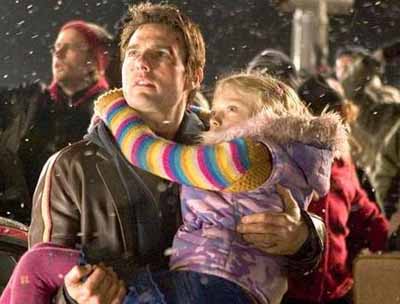
You could argue the same for Cloverfield, and I would say that of all the films to hint at, or outright steal, imagery and ideas from 9/11, Cloverfield is the most obsequious. Director Matt Reeves, most likely aided and abetted by producer JJ Abrams, decided not only to skirt the imagery of 9/11 for their purposes, but seemed intent on mimicking those horrible events as much as they figured good taste could allow them to. The collapse of a building viewed by shocked onlookers during the initial alien-attack moments of the film, where the head of the Statue Of Liberty is flung down a street, is pure news footage-esque of 9/11. To try and deny it is ludicrous. Spielberg, getting back to War of The Worlds for a moment, made the concept of having dessicated human remains turned into grey powder actually fit within the narrative of the film, and so he could argue that the fact it looked like post-Twin Towers collapse was just happenstance. Folks up in arms about Paul Greengrass and Oliver Stone capitalizing on the tragedy of 9/11 should remember that both filmmakers had permission from, and actively sought consultation with the families involved directly in their stories – the families of those killed on United Flight 93, and the two officers (portrayed by Michael Pena and Nicolas Cage) trapped beneath the rubble of the WTC.
The use of tragedy by filmmakers to deliver an entertainment is nothing new. Ever since it could, Hollywood has used combat, in war or any other style, as a way of giving audiences an escape from their humdrum lives. War films, to pick a simple example, often rely on depicting actual events for their stories, even if the characters within may be fictionalized. Is this form of tragedy, whereby hundreds of thousands of people are killed in war situations, any less salient than the collapse of the WTC – aside from political context? People died, period. The how and the why would, to an intelligent observer, be irrelevant to this single fact. Extrapolating this out, how is the tragedy of Auschwitz any less affecting than the thousands killed during 9/11; it isn’t, actually, it’s just that the Holocaust is separated by the distance of time. It’s still an enormous tragedy, it’s just that the modern world has moved on. Spielberg (God, does this man skirt controversy?) reinvigorated our examinations of this dark chapter in human history with Schindler’s List, a powerfully moving film about a man fighting against his own loyalty to his country to save the lives of those in the line of fire. Rightfully, it won the Best Picture Oscar for 1993, and gave Spielberg his first Best Director gong. Yet, should it? Spielberg, thanks to the terrific writing of novelist Thomas Keneally, capitalized on the deaths of millions in the name of art, and was roundly awarded everything under the sun. What makes Schindler’s List different from somebody else using the trauma and carnage of more recent history to deliver a story – fictionalized or not? Is it too long a bow to suggest that perhaps it’s the advantage of time from the subject, in this instance World War II, that prevents the moral outrage from being heard?
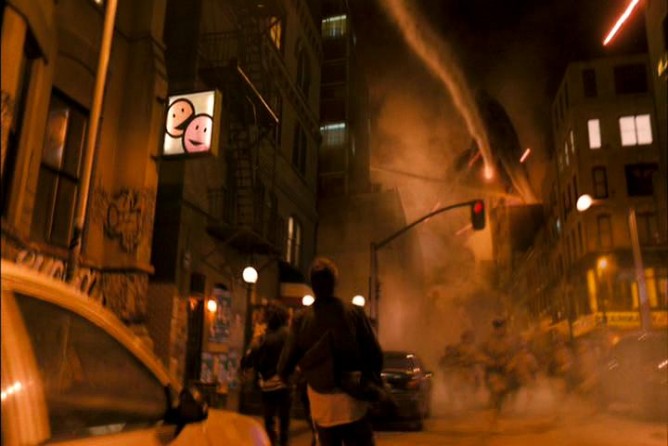
Again, I believe it’s intent. Spielberg’s Schindler’s List, even though it sought to deliver a semi-biographical account of Oskar Schindler’s brave acts during the Nazi era, was never anything but a retelling of true events. Embellishments aside, the things portrayed in Schindler’s List actually happened. Cloverfield, on the other hand, alongside War Of The Worlds and other “let’s get outraged” films seemingly capitalizing on 9/11 to a degree, are entirely fictional. Perhaps it’s our inherent unwillingness for fictional events, events we perceive to be outside the realm of possibility or probability, to cross over into the real world. The jarring cross-pollination of using reality to further a fictional world – specifically via a tragedy of monumental proportions – seems anathema to modern audiences. Yet, we’re quite prepared to accept films like Saving Private Ryan (the Normandy landings and the quest to save a single soldier), The Thin Red Line (Guadalcanal), Platoon and Apocalypse Now as entertainment, even though they and countless others have been commercially viable thanks to the events contributing to the deaths of millions.
I return to the assassination of President Kennedy, quite possibly the most game-changing event in the entire 20th Century outside of the moon landing. Ever since, the fascination with the death of JFK has held filmmakers in its thrall. Films, television shows, even music has used this tragedy to great effects, even though it often comes at the cost of the emotional feelings of those involved at the time. What did Jackie Kennedy, former First Lady, think of all those parodies and “fictional” versions of the events of that fateful day in November 1963? Do you think she saw it like the rest of us did: as a simple story? I’m sure the entire Kennedy clan would have probably chosen to ignore and avoid any mention of that event – even if it was a significant world event – as they sought closure on it, and no doubt the constant fascination with it by film and TV execs must grate from time to time. There are those who say that because JFK was a public figure that it’s okay to make light of, or otherwise use for entertainment purposes, the death of the man, but I disagree. JFK was a man who lived his life in the spotlight, of that there is no doubt (and the same argument should be made for the late Princess Diana) but in death there should be respite, shouldn’t there? The line at crass commercialism in the death of one or a thousand people needs to be kept in view at all times. Can you imagine if James Cameron had made Titanic in 1913 instead of 1997? What hue and cry there would have been. Instead, just shy of a century later, it became the most successful film of all time.
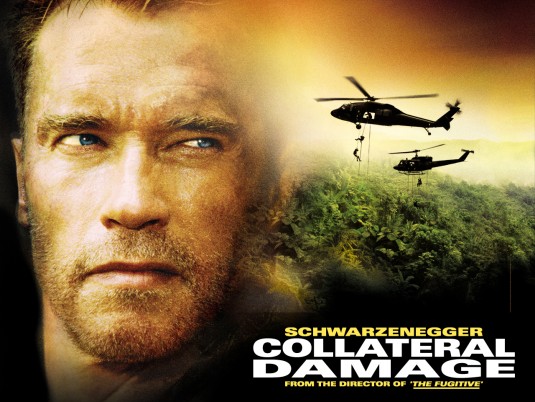
Making a film about a real event is always fraught with danger, because the filmmakers are never going to appease all the vested interests: somebody is always going to find something to complain about. With 9/11, it’s become pretty obvious that a lot of folks, especially those in the USA, still find it tough to deal with and despise anyone trying to manipulate a film audience by plagiarizing the images of that day. What I hate about this kind of collective moral outrage, however, is that it leaves no room for film (and by extension television) to examine these events in an artistic manner. People need to work through this grief, and in order to do so they need to get through their personal emotional connections to that event – trying to blame filmmakers and storytellers for bringing these emotions back into focus isn’t the answer, but rather it should be a motivation to those who are outraged to seek out a way of coming to terms with their unresolved anger or resentment. Unless these people do so, we’re forever going to be stepping on eggshells whenever something approximating a Presidential assassination, terrorist attack, royal death or other such tragedy is brought up on-screen. Film-makers need to be able to find a way to tell their story without having to dilute their work to appease a vocal minority.
What makes me laugh a little is the fact that a growing proportion of the intended audience for The Avengers are young teenage boys (a broad generalization, but if you can find proof to the alternative I’m open to it), most of whom weren’t even born – or were infants – when 9/11 occurred. They learned of 9/11 as a history lesson. They see New York being wrecked in The Avengers and don’t have the emotional connection that older viewers may have. Give it another twenty years, and that number will have dropped even further. With time, comes emotional distance. At what point can we look at imagery from 9/11 and not have an emotional reaction: probably never. Not until all who were witness to that horrible day are dead and gone will this issue rest, although having said that no doubt by that point there’ll be another massive Event which will prevent directors and filmmakers from showing another kind of destructive event lest it draw the ire of upset individuals seeking emotional recompense for a tragedy they try and maintain a crippling bond with.
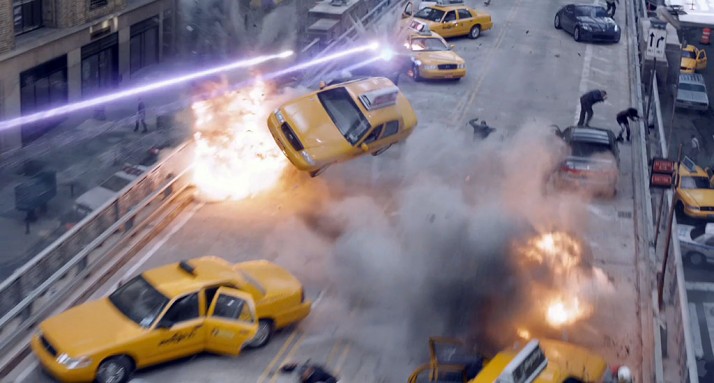
From what I can tell, there’s no firm answer to the question of “too soon?”, both with 9/11 or any other tragic event. It’s a question of taste and common sense, I suppose. Film-makers have a duty not to inflame a situation beyond the natural progression of an event, but in saying that there should be no restriction of those keen to examine the events portrayed even if they do provoke anger and resentment. Recent films such as Extremely Loud & Incredibly Close, or Reign Over Me, which examined the after-effects of 9/11, need to be made. They help an audience deal with their own issues with the tragedy. Are they deemed insensitive to folks affected by those events? Where’s the clamor for editorial restraint on that?
As far as The Avengers goes, I’m annoyed that people would still be trying to tie in any New York destruction with 9/11 – guys, it’s entertainment and that’s allowed. Battleship saw an alien craft plunge through Tokyo, destroying buildings and “killing thousands”, and yet nobody in the Western media thought to say “hang on, that reminds me of 9/11″… of course it didn’t, because the Twin Towers were in New York… it’s an American moral outrage. As far as I’m concerned, the continuing use of the 9/11 emotion to try and deny filmmakers the right to entertain mass audiences is gradually wearing out its welcome, and I am happy that’s happening. Don’t get me wrong: what happened on 9/11 was a truly terrible event, and we should always remember those who perished in that most horrendous of attacks, but to continually link those events with a perceived slight by filmmakers trying to do their job seems counterproductive to people moving on. Memorializing the dead isn’t the issue, rather, it’s an inner inability to overcome one’s own grief over the matter and allow portrayals to be seen for what they are: artistic dramatizations.
Or, perhaps, just happenstance.
